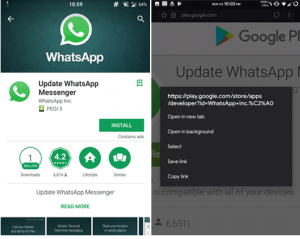Twitter recently discovered that due to a flaw the users’ passwords were stored in a log file unencrypted. All twitter users are urged to change their passwords. More information can be found on twitter’s blog.
Twitter recently discovered that due to a flaw the users’ passwords were stored in a log file unencrypted. All twitter users are urged to change their passwords. More information can be found on twitter’s blog.
from www.scmagazineuk.com
If the visitor clicks anywhere on the page, then according to Cable, “LinkedIn interprets this as the AutoFill button being pressed, and sends the information via postMessage to the malicious site”. A vulnerability in LinkedIn’s Autofill feature allowed malicious actors to harvest personal information of LinkedIn users by inserting autofill iframes over websites that were whitelisted by LinkedIn, a security researcher has revealed.According to researcher Jack Cable who described the exploit in a detailed blog post, once a malicious actor lures a victim to visit a malicious website which is controlled by the former, the visitor is then greeted by a “LinkedIn AutoFill button iframe” which is styled so it takes up the entire page and is invisible to the user.
More information here
From macrumors.com
There appears to be a serious bug in macOS High Sierra that enables the root superuser on a Mac with a blank password and no security check.
The bug, discovered by developer Lemi Ergin, lets anyone log into an admin account using the username “root” with no password. This works when attempting to access an administrator’s account on an unlocked Mac, and it also provides access at the login screen of a locked Mac.
Full article here.
From inforisktoday.com
Want to stop the latest cybercrime bogeyman? Then for the umpteenth time, put in place well-known and proven strategies for repelling online attacks.
That’s one takeaway from a recent threat report issued by Britain’s National Cyber Security Center. Based on open source reporting, the alert calls out a trio of attack campaigns: phishing emails that pretend to be speeding tickets but which instead deliver malware; attackers using stolen or fraudulently obtained digital certificates to “sign” malware; and the cybercrime-extortion group known as the “The Dark Overlord,” which continues to hack into organizations’ websites, hold data for ransom and cause chaos.
Full article here.
From thehackernews.com
Cybercriminals are known to take advantage of everything that’s popular among people in order to spread malware, and Google’s official Play Store has always proved no less than an excellent place for hackers to get their job done.
Yesterday some users spotted a fake version of the most popular WhatsApp messaging app for Android on the official Google Play Store that has already tricked more than one million users into downloading it.
Dubbed Update WhatsApp Messenger, came from an app developer who pretended to be the actual WhatsApp service with the developer title “WhatsApp Inc.”—the same title the actual WhatsApp messenger uses on Google Play.

Full article here.
From threatpost.com
Cisco said Wednesday that multiple Cisco wireless products are vulnerable to the recently identified Key Reinstallation Attacks (KRACK).
On Monday, researchers revealed how the KRACK vulnerabilities plagued the WPA2 protocol used to secure all modern Wi-Fi networks. In their report, researchers demonstrated how the KRACK vulnerabilities can be abused to decrypt traffic from enterprise and consumer networks with varying degrees of difficulty.
U.S. CERT advised users to patch immediately.
Full article here.
Related post: Wi-Fi Protected Access II (WPA2) compromised
from zdnet.com
Downloads of a popular Mac OSX media player and an accompanying download manager were infected with trojan malware after the developer’s servers were hacked. Elmedia Player by software developer Eltima boasts over one million users, some of whom have may have also unwittingly installed Proton, a Remote Access Trojan which specifically targets Macs for the purposes of spying and theft. Attackers also managed to compromise a second Eltima product – Folx – with the same malware. The Proton backdoor provides attackers with an almost full view of the compromised system, allowing the theft of browser information, keylogs, usernames and passwords, cryprocurrency wallets, macOS keychain data and more.
Full article here.